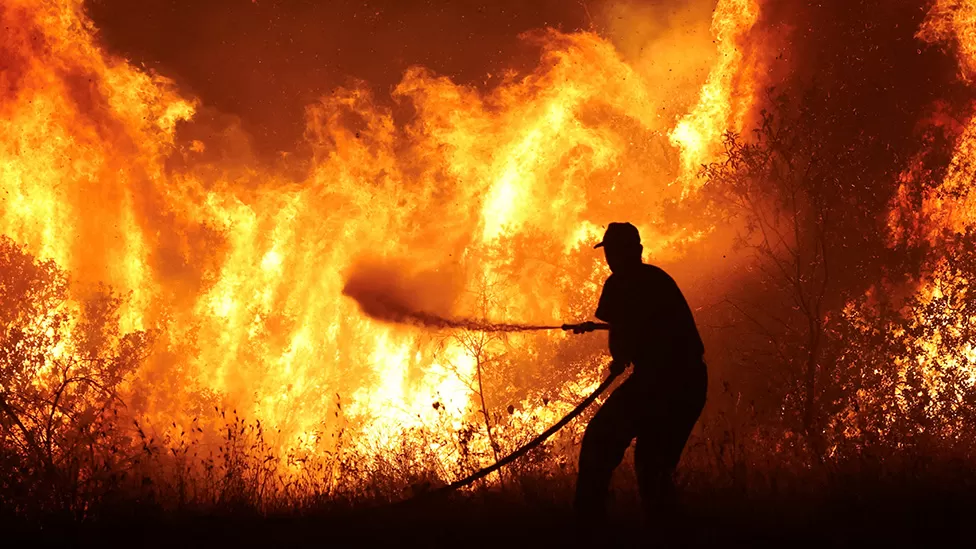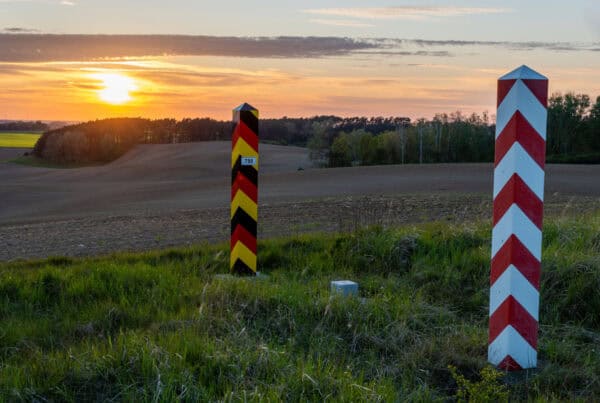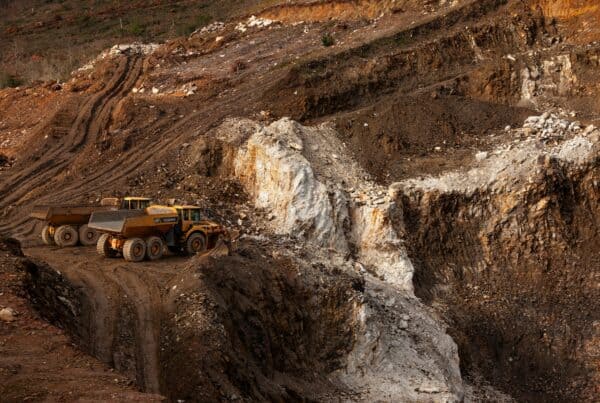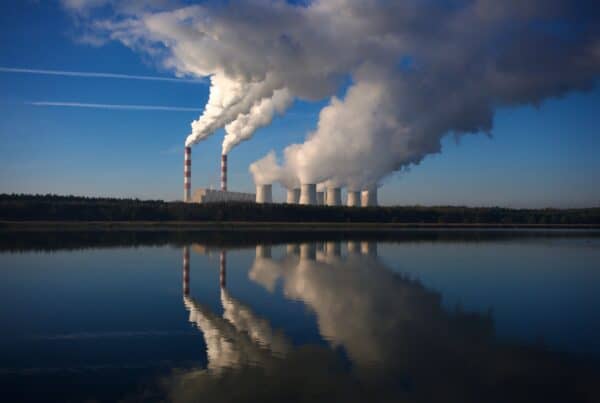Greece’s picturesque landscapes and rich biodiversity are under siege from an increasing number of vegetation fires. These fires, driven by both natural and human factors, present significant economic and environmental challenges. The country’s hot, dry summers create ideal conditions for fires, while human activities, including negligent behaviour and arson, contribute substantially to their occurrence.
Environmentally, the impact is devastating. Biodiversity suffers as ecosystems are disrupted and wildlife populations decline, especially – as we will see – in rural areas and islands (as seen in the map below, popular islands such as Corfu, Rhodes, Evia where hit in late July 2023). Soil erosion following fires leads to further degradation of the landscape and water quality, affecting agriculture and ecosystems. The fires contribute to air pollution, presenting health risks to communities, particularly vulnerable populations. Moreover, the release of CO2 from burning vegetation exacerbates climate change, creating a feedback loop that increases the risk and intensity of future fires.
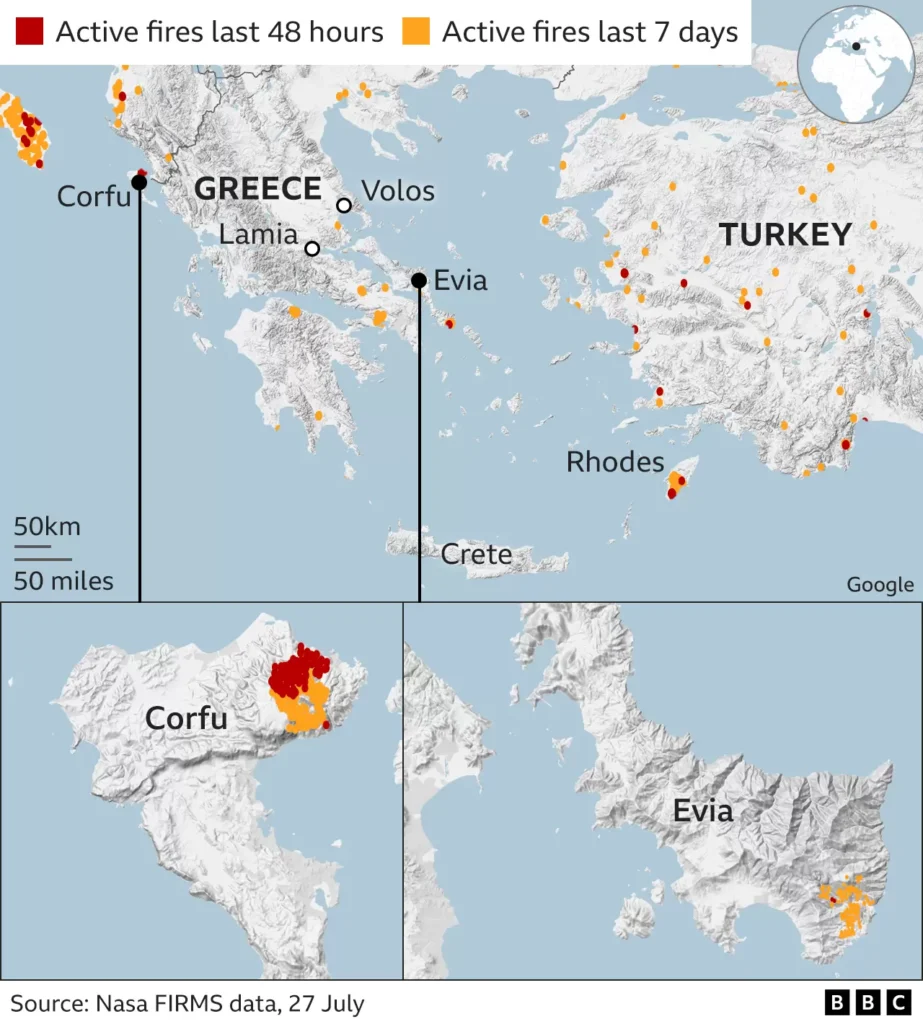
Greece has been also grappling with severe floods, with thousands of people rescued in September 2023.[1] Local officials reported that extreme rainfall turned streets into rivers, destroyed buildings and bridges, and submerged entire villages. The floods, which also affected neighbouring Bulgaria and Turkey, have resulted in at least 14 deaths across the three countries, including six in Greece.[2]
The region of Thessaly, known as Greece’s agricultural heartland, has been the hardest hit, with government spokesperson Pavlos Marinakis describing the floods as the country’s most significant ever. Volos, Pelion, Karditsa, and Trikala are among the worst affected areas. Despite days of relentless downpour, weather forecasts suggest some respite as the rainfall is expected to weaken.
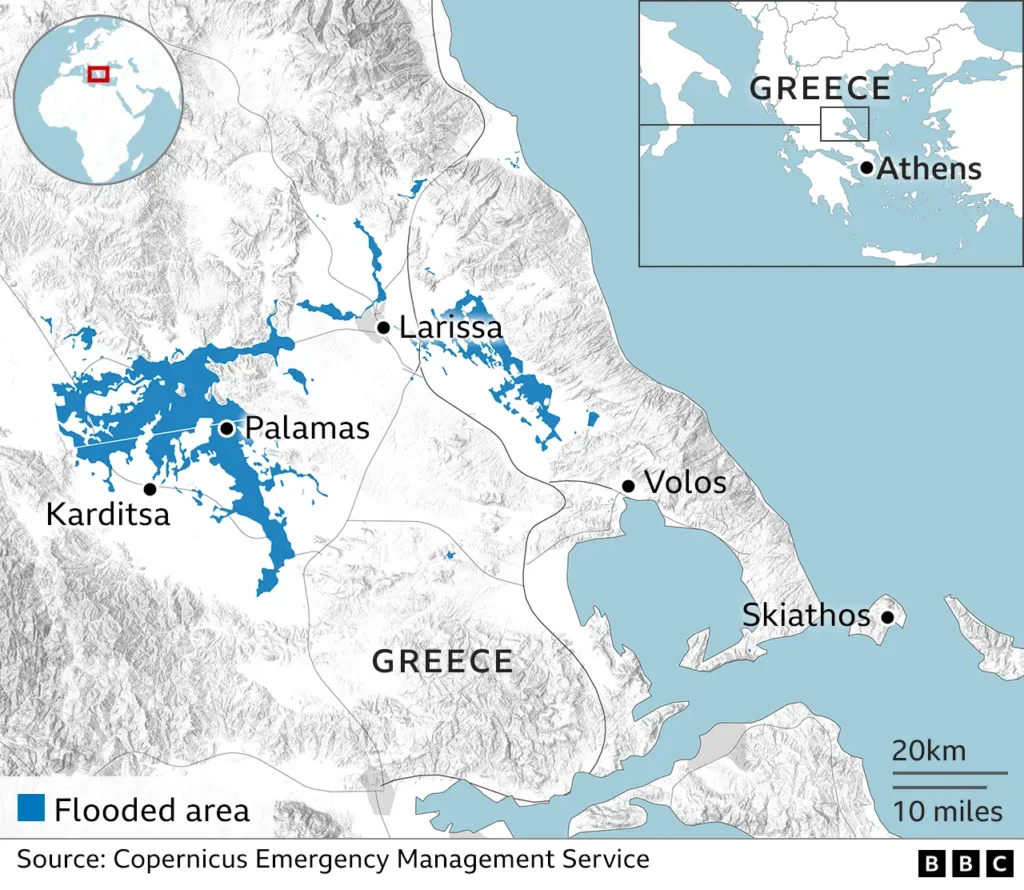
This catastrophic flooding follows closely on the heels of deadly wildfires that ravaged northern Greece, accentuating the country’s vulnerability to extreme weather events. Prime Minister Kyriakos Mitsotakis has said Greeks face “a very unequal battle” with nature.[3]
Addressing the multifaceted issue of vegetation fires and rainwater floods in Greece demands a comprehensive approach. This includes enhancing fire prevention and response strategies, restoring and managing land sustainably, and adopting measures to mitigate and adapt to climate change. Protecting Greece’s natural heritage and ensuring the well-being of its economy and communities requires concerted efforts from government, local stakeholders, and the international community.
The economic impact on Greece
Economically, the fires wreak havoc on various sectors. The forestry industry suffers losses in timber reserves, affecting employment and revenue. Agriculture faces destruction of crops and infrastructure, diminishing productivity and farmers’ income. The tourism industry, a cornerstone of Greece’s economy, experiences downturns as fires degrade natural beauty and deter visitors, impacting local businesses and employment.[4] Additionally, the costs of fighting fires and recovery efforts strain public resources, diverting funds from other critical areas.
Europe has faced significant financial and environmental losses due to wildfires, with damages estimated at €4.1 billion ($4.43 billion) this year alone.[5] The extreme heat affecting the Mediterranean region, from Greece to Spain, has contributed to widespread forest blazes as can be shown in the map below.
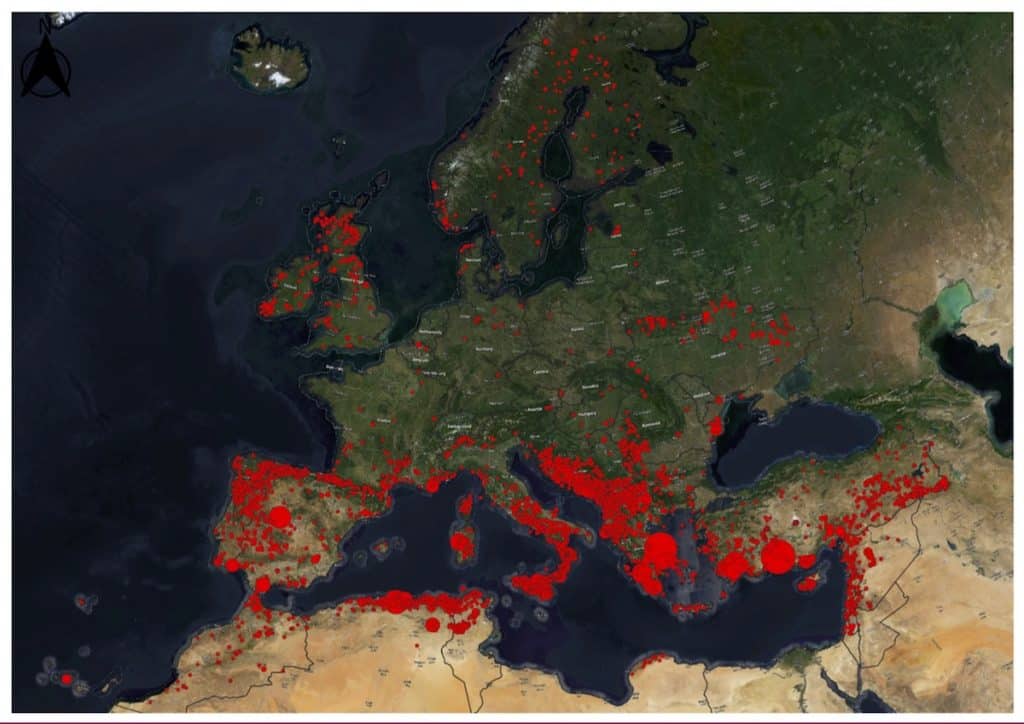
An affected Greek tourism sector
Over the weekend 22-23 July 2023, approximately 20,000 individuals were compelled to evacuate their homes and hotels in Rhodes as a raging inferno, which began the Tuesday before, advanced toward the coastal resorts in the island’s southeast.[6] The situation reflects the severity of the wildfires affecting many other tourist destinations, leading to significant disruptions and the displacement of thousands of residents and tourists seeking safety from the fast-spreading flames. Major airlines, including TUI from Britain, easyJet, and Jet 2, have responded to the crisis in Rhodes by arranging extra flights to accommodate the need for evacuations and travel adjustments.[7] Below there are two maps showcasing the wildfire epicentres of Rhodes and Corfu, notorious tourist-populated islands.
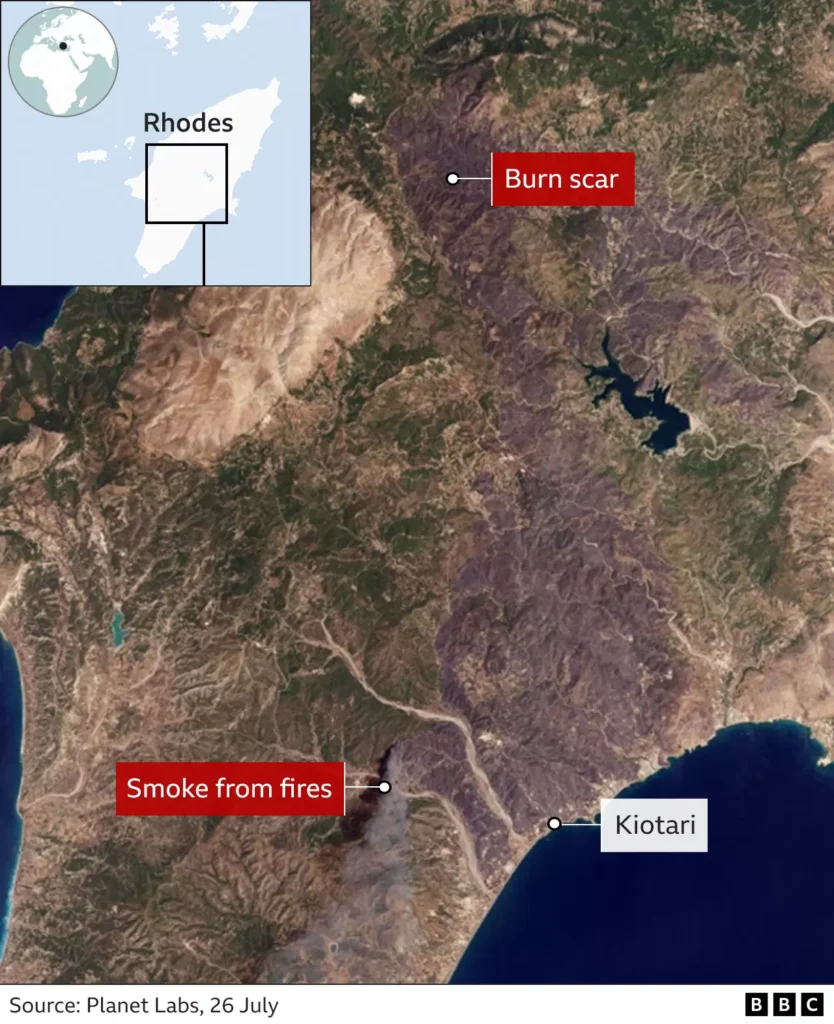
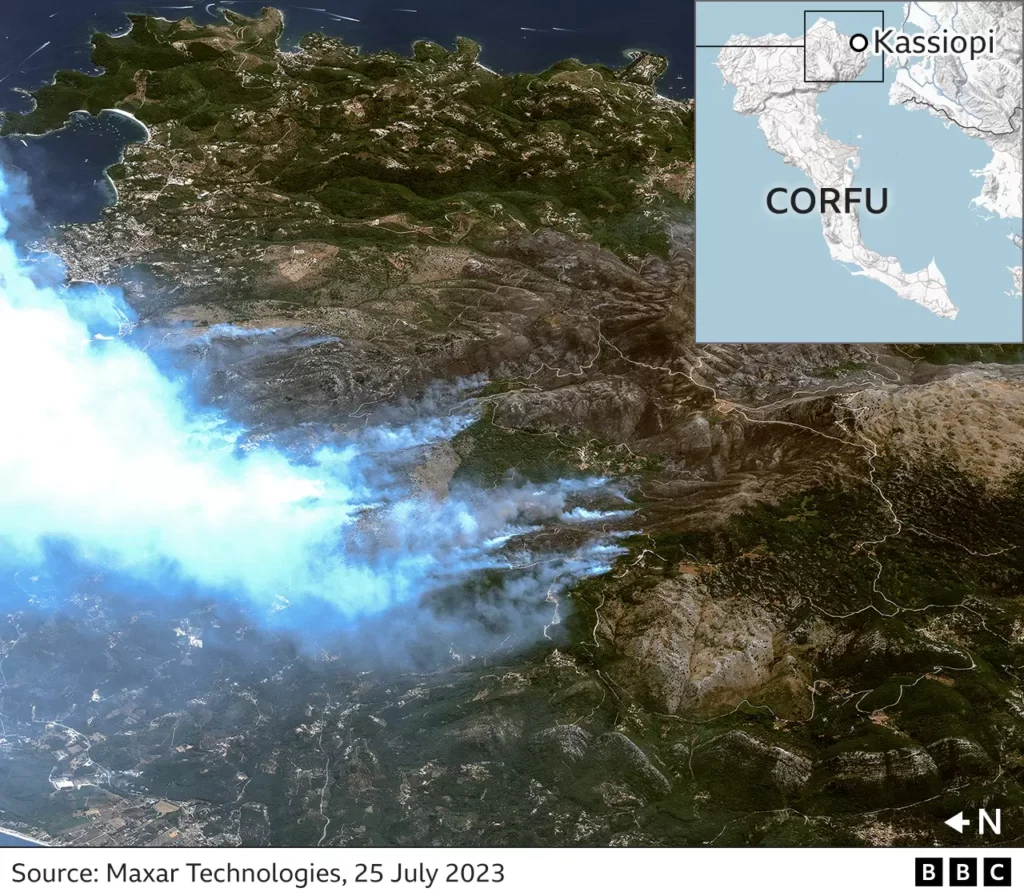
Source: BBC 2023
The situation underscores the vulnerability of Greece, a country frequently afflicted by wildfires during the summer, now exacerbated by climate change-induced extreme heatwaves across southern Europe. These environmental challenges pose a risk to the tourism industry, which is crucial for Greece’s economy, accounting for 18% of its GDP and one in five jobs. The dependency on tourism is even more pronounced in Rhodes and other Greek islands.[8]
Moody’s ratings agency recently highlighted in a report the potential long-term consequences of heatwaves on southern Europe’s appeal as a tourist destination.[9] The agency warns that these climate conditions could diminish the attractiveness of the region during the summer months, adversely impacting the local economy and tourism sector. This report underscores the growing concern that climate change may deter tourists from visiting areas prone to extreme weather events, prompting a need for sustainable solutions and adaptation strategies.
Agricultural concerns
Greece is grappling with extensive agricultural damage due to recent crises, significantly impacting its economy and food production. Fruit trees, corn, and about a fifth of the country’s cotton crop have been destroyed, alongside over 200,000 animals and poultry.
The Thessaly plain, central to Greece and known as one of the main agricultural regions, has been among the worst hit. Known as Greece’s breadbasket, Thessaly is crucial for its rich fertility and significant contribution to the nation’s agricultural output, including about 20% of the agricultural land and a substantial portion of the Greek cotton crop. The region’s devastation has raised concerns over national food production and the potential long-term impact on the economy.
Restoration efforts are daunting. While crops like cereals and cotton may be replanted within the next few months, the regeneration of orchards and livestock herds, pivotal for producing traditional Greek products like yogurt and feta cheese, will take much longer. This prolonged recovery will likely affect the local economy, livelihoods, and the national agricultural output, emphasizing the need for sustainable agricultural practices and robust disaster management strategies to mitigate future risks.
“We now have damage to housing infrastructure, and also municipality services, roads, schools, primary health units, and so on. If we don’t manage to restore them as soon as possible, then we have the problem that the people will have to go somewhere else to live” said Spiros Kintzios, rector of Greece’s Agricultural University.[10]
A 2023 study by Kalogiannidis et al.[11] highlights the intricate relationship between agricultural risks, vulnerabilities, and resilience practices and their collective impact on sustainable rural economic development. It points out that the well-being and prosperity of rural areas are closely tied to the safety and stability of farmers’ living environments. Agricultural communities face material vulnerability due to precarious financial conditions and the high costs associated with repairing long-neglected homes, thereby increasing the danger of falling back into poverty. Inadequate insurance coverage, poor implementation of social measures, and their misalignment with local realities further exacerbate this vulnerability, placing immense pressure on the most susceptible members of society, the resource base, and the environment’s capacity to recover.
The study emphasizes the importance of enhancing rural resilience to counteract the effects of natural disasters and market risks. The disparities between rural communities in Greece and those in other developed countries, despite urbanization and economic growth, necessitate a focused attention on rural economy development, effective communication between government and communities, and the empowerment of individuals to express their needs.
The economic repercussions of wildfires in Greece are further exacerbated by the low rate of insurance coverage for such disasters. Between 1990 and 2019, only 9% of wildfire losses were insured, leaving the vast majority of recovery costs uncovered.[12] Without adequate insurance, the financial burden of wildfires falls heavily on households and businesses directly affected by the fires. This not only strains the resources of these individuals and entities but also places a significant load on domestic banks, which may face increased defaults and financial instability. Consequently, there could be broader implications for the lending environment and overall economic stability in Greece, underscoring the need for government intervention and more robust insurance mechanisms to mitigate the financial impact of future wildfires.
Addressing the causes: climate change
Climate change plays a significant role in amplifying wildfire risks, with global temperatures rising on average by 1.2°C since pre-industrial times. This increase has led to more frequent and intense heatwaves and droughts, creating conditions conducive to fires, particularly in susceptible regions like the Mediterranean.[13] The fire weather index, a scientific tool measuring vegetation flammability based on temperature, humidity, wind speed, and recent rainfall, shows that the Mediterranean has experienced a rapid increase in extreme values since the late 20th century, leading to 29 more days of extreme fire weather annually.[14]
In determining the cause of a wildfire, it’s crucial to differentiate between ignition sources and predisposing conditions. While climate change significantly dries and primes vegetation for burning, it doesn’t directly ignite a fire. A spark, either from human activities or natural occurrences like lightning, is needed to start a blaze. In Greece, while some fires have been attributed to arson,[15] it’s actually a minor cause overall, responsible for only around 23% of wildfires.[16] Typically, wildfires originate from agricultural practices such as burning crop residue or to stimulate pasture grass growth, or from clearing unwanted vegetation in scrubland and grassland areas.
Greece, a part of this vulnerable region, has witnessed severe fire weather conditions stemming from heatwaves, which have become at least 50 times more likely due to climate change.[17] Global climate changes are leading to alarming predictions about the future frequency and intensity of wildfires. According to the UN Environment Programme, there is an anticipated increase in extreme wildfires of up to 14% by 2030 and 50% by 2100.[18] This projection is particularly concerning considering the escalating impact of wildfires on ecosystems, economies, and communities worldwide. As shown in the chart below, 2021 drastically surpassed the previous 12-year average of yearly cumulative burnt areas.
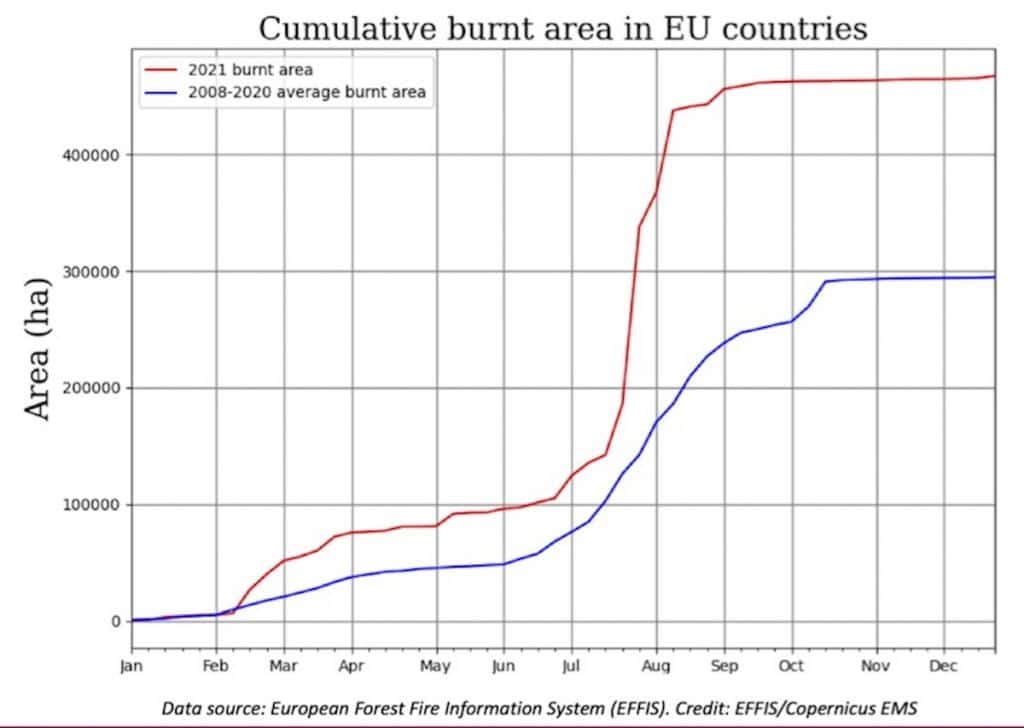
Moreover, even if global warming is limited to 1.5°C, aligning with the target set by nations under the 2015 Paris Agreement, the Mediterranean region is still expected to witness a substantial increase in fire incidents, with a projected 40% greater area at risk of burning.[19] If global warming exceeds 2°C,[20] the frequency of extreme fire weather conditions will rise. However, the most severe impacts can still be avoided if there is a rapid reduction in greenhouse gas emissions. This data highlights the critical importance of robust climate action and effective wildfire management strategies to mitigate the increasing threat posed by wildfires in the context of global warming: curtailing the combustion of fossil fuels, the main driver of climate change and extreme weather, is a crucial step in mitigating future wildfire risks and ensuring global climatic stability.
Sources
-
https://edition.cnn.com/2023/09/07/europe/greece-floods-storm-rescue-climate-intl/index.html ↑
-
https://edition.cnn.com/2023/09/06/europe/greece-europe-extreme-weather-climate-intl/index.html ↑
-
https://www.bbc.co.uk/news/world-europe-66751510 ↑
-
https://www.nytimes.com/2023/07/26/world/europe/wildfires-greece-tourism.html ↑
-
https://www.bloomberg.com/news/articles/2023-09-04/greece-suffers-most-damage-as-wildfires-cost-europe-4-1-billion ↑
-
https://www.reuters.com/world/europe/tourists-flee-greek-island-rhodes-wildfire-thousands-evacuated-2023-07-23/ ↑
-
https://www.reuters.com/business/aerospace-defense/jet2-adds-more-flights-bring-britons-back-rhodes-2023-07-24/ ↑
-
https://www.reuters.com/world/europe/europes-sweltering-summer-could-send-tourists-cooler-climes-2023-07-18/ ↑
-
https://www.reuters.com/world/europe/repatriation-flights-head-greece-wildfires-force-tourists-flee-2023-07-24/ ↑
-
https://www.bbc.com/news/world-europe-66938011 ↑
-
https://www.mdpi.com/2077-0472/13/6/1222 ↑
-
https://www.scopegroup.com/dam/jcr:a3c101e0-5c39-45ae-9f62-5d98e77e7e5a/Scope%20ESG_Wildfire%20Greece_case%20study_Oct23_051023.pdf ↑
-
https://www.ipcc.ch/report/ar6/wg1/downloads/report/IPCC_AR6_WGI_SPM.pdf ↑
-
https://agupubs.onlinelibrary.wiley.com/doi/full/10.1029/2020RG000726 ↑
-
https://www.independent.co.uk/news/world/europe/corfu-wildfires-greece-rhodes-b2381320.html ↑
-
https://www.mdpi.com/2571-6255/4/2/18 ↑
-
https://www.worldweatherattribution.org/extreme-heat-in-north-america-europe-and-china-in-july-2023-made-much-more-likely-by-climate-change/ ↑
-
https://www.unep.org/resources/report/spreading-wildfire-rising-threat-extraordinary-landscape-fires ↑
-
https://www.nature.com/articles/s41598-017-00116-9 ↑
-
https://agupubs.onlinelibrary.wiley.com/doi/full/10.1029/2020RG000726 ↑


